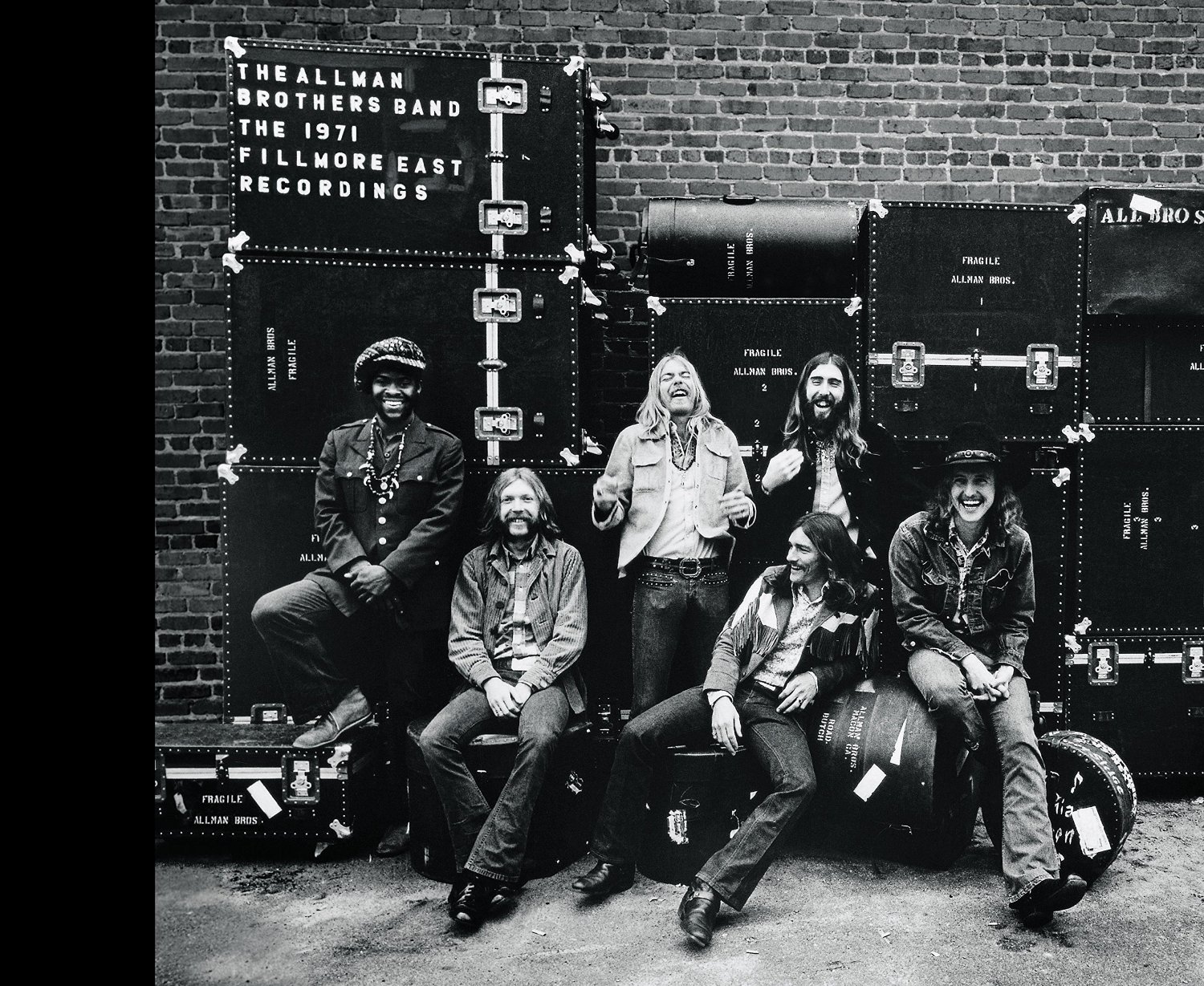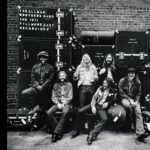
Mercury/UMe
The thing is, not long after the original Allman Brothers Band’s At Fillmore East was released in 1971, the mold was truly broken.
Pulled from two all-nighters’ worth of music recorded that March, At Fillmore East hit the streets in June, unleashing the ABB’s wildass mix of rock, blues, jazz and marrow on the world.
Four months later guitarist Duane Allman laid his Harley Davidson down for the last time, silencing one of the greatest guitarists this world has ever known. And a little over a year later – and only a few hundred away as the crow flies – Berry Oakley took his Triumph on his own final ride.
No matter how dark things have gotten or how brightly they’ve shown for the Allman Brothers Band in the years since, they’ve never been the same as they were when that original lineup was banging on all cylinders.
But saying that out loud is really only reiterating what the world already knows. The Allman Brothers’ At Fillmore East was recognized as some kind of crazy masterpiece back in 1971 – and has since become a fixture on just about any list of all-time live albums. If you want to blow some beginning guitarist’s mind, At Fillmore East is what you give them; if you want to travel in a space where Blind Willie McTells’ and John Coltrane’s spirits both reign supreme, At Fillmore East will take you there; put it on and you will have a place to go, no matter how empty or full your pockets or heart are.
So let’s get down to the meat of the matter here: if you already own the original At Fillmore East album you basically have what legendary producer Tom Dowd felt were the band’s best performances from that March, 1971 run. Add in 1972’s Eat A Peach and you have a couple more tracks that simply couldn’t be fit on the two-LP Fillmore album. 1992’s The Fillmore Concerts revisited that same run of shows, taking advantage of CD technology to offer up an expanded, remixed collection of songs from those nights. Plus there are tracks included on various collections – and, of course there are boots.
But the fact of the matter is this, boys and girls: if you really want to know what it was like to be in that sweet spot in the orchestra pit at the Fillmore East where it all just sounded right – and hear everything that was committed to tape during that historic run of shows in March of 1971 (along with the Allman’s final-ever set at the Fillmore, recorded in June of that same year), then the 6-disc At Fillmore East: The 1971 Fillmore East Recordings is for you.
Some quick clarification to snuff out any confusion fueled by urban legends: the Brothers’ run at the Fillmore actually spanned three days: Thursday 3/11 through Saturday 3/13 – with an early and late show both nights. No tape exists of the 3/11 shows; supposedly Tom Dowd rolled tape at some point, as he used it to make his point that the three-horn lineup the ABB had invited to sit in just wasn’t going to work for a live recording. Whether Dowd destroyed the evidence of what he captured on 3/11, it was taped over on a subsequent night, or it was simply lost over the years – there’s none to be had at this point in time. What you do hear is everything from 3/12 and 3/13 – both early and late shows: four sets spread over five CDs. The sixth disc in the collection is from June 27 – the last live music played at the Fillmore before it closed its doors forever.
Producer Bill Levenson’s mix brings the old Fillmore itself into the overall mix, using the hall’s natural ambience to flavor the music – and the result is both noticeable and positive. The one single most noticeable element of revisionist history in Levenson’s mix is his handling of the tracks that included saxophonist Rudolph “Juicy” Carter from 3/12. Carter – the only survivor of Tom Dowd’s horn purge after the previous night’s performances – nestles in between Duane Allman and wingman Dickey Betts on “In Memory Of Elizabeth Reed” and his performance might leave many wondering why he wasn’t a regular with the Brothers. The truth is, what you hear – the most obvious parts, anyway – are what Levenson felt were the best moments from Juicy Carter, brought to the foreground of the mix. The natural bleed from mic-to-mic prevented Carter’s wilder moments from disappearing altogether (turn it up and listen), but Levenson has actually offered him up in the best light possible. Percussionist Bobby Caldwell also sits in on the track, emphasizing the song’s Latin-y core.
The best moments of all, however, are when the ABB themselves are alone and feeding off each other (with honorary Brother Thom “Ace” Doucette often adding some tasteful harp). It may sound funny to say it, but this is warts-and-all at its best: whatever less-than-perfect moments there are, nothing is capable of derailing this lineup – if anything, they seem to rally even harder after each fumble.
The second set on 3/13/71 is actually from 3/14 as a bomb scare cleared the old theatre during the night, pushing everything way out in time. “Good mornin’, everybody,” somebody says as the Brothers take the stage. The sixth set in three nights would’ve been an auto-piloted-let’s-do-this-and-go-the-hell-home run for many bands, but the Allman Brothers play with a sweat-drenched fierceness that never betrays the fact that the sun is actually rising outside the Fillmore’s doors.
The final disc from 6/27 is chock full of brilliant moments and fire (itself an early-AM set), but the best run of tunes might just be from the wee hours of Sunday, March 14. “Statesboro Blues” is a familiar touchstone to use as a launchpad; “One Way Out” is a little rough-and-tumble in places; but the band locks in on the slow-cooker blues of “Stormy Monday” and never looks back. Oakley’s low-end rumble on “Hot ‘Lanta” is ominous, but when he lets loose on “Whipping Post” it’s downright terrifying. Gregg Allman might have been only 23 years old at the time, but he sings with the voice of a scarred-soul veteran bluesman (and displays some solid organ chops – something that has often been forgotten over the years). The percussion versatility of Butch Trucks and Jaimoe is displayed throughout the extended adventure of the 23-minute “Whipping Post” and on into “Mountain Jam” as Duane Allman and Dickey Betts let the muse do the picking. Nobody was going through the motions this night/morning – and the Brotherhood was never stronger.
The final encore that early morning – “Drunken Hearted Boy”, featuring guests Elvin Bishop on guitar and vocals, percussionist Caldwell, and keyboardist Stephen Miller is almost anti-climactic: the performance is one big loosey-goosey grinning blues blowout by all hands and would probably be a centerpiece on about any other album. Here, you can almost hear the steam rolling off the Allman Brothers as they play, knowing they just blistered their way through one of the finest hour’s-worth of music of their lives.
When the crowd roars for more, Duane tells them, “Hey, listen: it’s six o’clock, y’all. Look here – we recorded all this. This is gonna be our third album and thank you for your support.
“You’re all on it,” he says, then lets loose with a weary laugh. “We ain’t gonna send you no check, but thanks for your help.”
No, Duane … thank you.
*****
Brian Robbins watches the sun rise over at www.brian-robbins.com



No Comments comments associated with this post